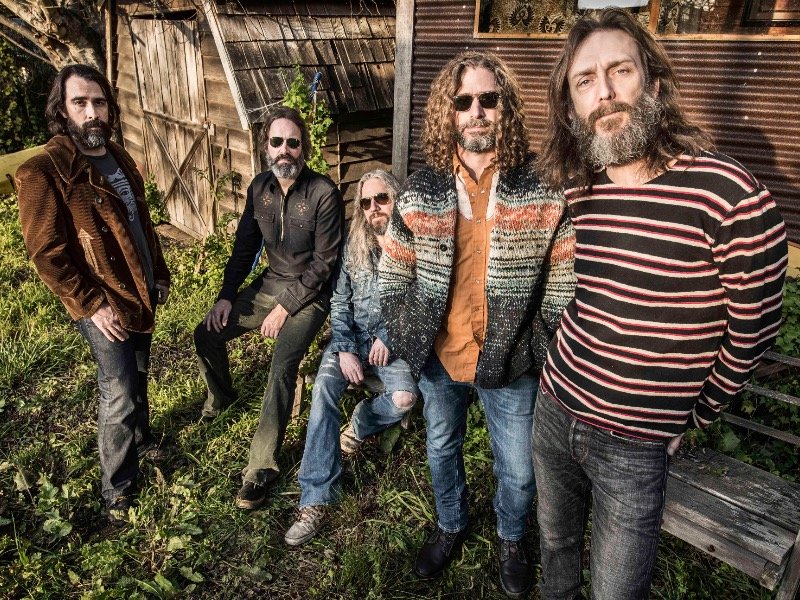Chris Robinson, whose fearless swagger and hard rock bravado personified the Southern-fried boogie band The Black Crowes for more than 30 years, parted ways with his former bandmates in 2010 to head in a different direction.
The singer-songwriter-guitarist walked away from megawatt arena spotlights and big paydays to form The Chris Robinson Brotherhood, a band that cooked the blues, R&B, gospel, and rock and roll into a "Creole cosmic stew of American music." From the first CRB album, "Big Moon Ritual," in 2012 to the current release "Barefoot in the Head," Robinson said he’s been on an incredible six-year journey, one he wouldn’t trade for anything.
The Chris Robinson Brotherhood will perform at Turner Hall Ballroom on Friday, Nov. 17, at 8 p.m. Recently, Robinson spoke with OnMilwaukee about the upcoming show as well as some other career highlights.
OnMilwaukee: Is there a basic set list for the Milwaukee show? What can the audience look forward to?
Chris Robinson: Ah, that’s a good question, because it’s a bit unique there. With the proximity that Milwaukee has with Madison and Chicago, there’s a percentage of fans who will go to all the shows in the area. So, no, there isn’t a hard and fast set list because we want to make each performance different from the others. But it’s safe to say that we’ll do some material from the current album, a few old favorites and some brand new songs that haven’t been recorded yet.
The audiences at the CRB shows aren’t really expecting any Black Crowes songs, are they?
Nobody’s been asking for them. I don’t even see any Black Crowes T-shirts in the crowd. But that isn’t to say I’m not proud of the music we made as the Crowes. Those are some very good songs, and the time will come when I want to sing them again. But for now, I just want to follow the path I’m on.
How hard was it to walk away from what many people would call "success"?
(Laughs) Well, I’d say easy on one hand and hard on the other. When we released "Shake Your Moneymaker" in 1989, it was a huge hit. We didn’t find success; success found us. You might say that The Black Crowes’ trajectory was predetermined based on the sales from that album, and that’s not necessarily a good thing. One of the reasons I left the band was because I saw an opportunity to build something like the Brotherhood brick by brick, and in the way I wanted to see it built.
And the other reason?
Seeing tragic things happening around me. Look at Chris Cornell. What happened there? He worked hard to get where he was, writing and singing the songs he enjoyed. Maybe he shouldn’t have gotten his old band together again, you know? I understand the dark places in this business, and that’s really why I let go of the Crowes.
There’s always been a mix of influences in your vocals. I hear some early Bob Seger in there, a little Rod Stewart from the rowdy Faces days, and definitely Wilson Pickett and the great black singers.
Thank you for that, that’s nice to hear. I’m from the Atlanta area, where there’s a long history of preserving African-American sounds. Gospel, soul, all that beautiful music. I’ve always been able to find something I like in every kind of music.
It’s funny you’d mention Rod Stewart, because when I was just getting started, I only knew about him through the schmaltzy stuff he was doing at the time. One night after a bar show, a guy said I reminded him of what Rod had been doing before the other stuff. So I hunted down one of the old Faces albums and I loved it! I discovered Steve Marriott and Humble Pie the same way. Looking back into people’s work, I found all these hidden gems from Little Richard, Otis Redding, Freddie Stone, Frankie Miller and many other great singers.
Can you talk about the collaboration with Jimmy Page in 2000?
It was nothing short of incredible. The Black Crowes teamed up with Jimmy for a summer tour, and for three months, I experienced what it was like to sing with Led Zeppelin. Jimmy became a close friend who taught me a lot about singing in a rock and roll band. We’re all Zeppelin fans, and I certainly wasn’t going to go on stage and sing those iconic songs in a lackadaisical manner, you know? But I was amazed at how extensively we rehearsed for that tour. Jimmy left nothing to chance, and I couldn’t have been happier.
You seem pretty happy now.
(Laughs) I am! I live every day for the poetry, the challenges, the mysteries and whatever else comes along. Real success isn’t about the money, it’s about living the way that’s right for you. The most luxurious thing in life is to be truly happy.







